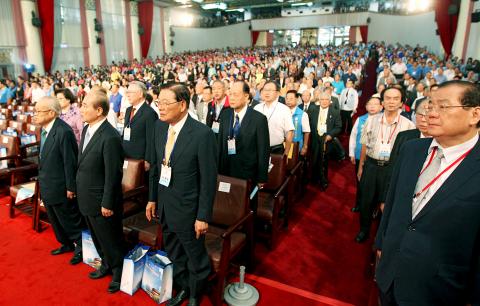The Chinese Nationalist Party’s (KMT) national congress yesterday passed an amendment to the party’s charter to allow members to directly vote for local branch directors, an amendment seen by some as aiming to weaken the party chair’s hold on power.
Local branch directors had previously been appointed by the head of the party.
Under the amendment to Article 26 of the charter, local branches will be able to elect their own directors, though the party leadership will retain the authority to appoint deputy directors and to ratify local appraisal committee members.

Photo: CNA
The KMT now has two months to form a committee to implement the changes that were outlined in the local branch amendment.
In line with the amendment, the party could hold combined elections in August next year for its chairperson, local directors and party representatives, which would be a first since the KMT’s founding more than 100 years ago.
In her closing remarks to the congress, which was held at Zhongshan Hall on Yangmingshan in Taipei, KMT Chairwoman Hung Hsiu-chu (洪秀柱) said she supports any change that can expand membership and connect the party’s leadership with its grassroots constituents.

Photo: Lu Yi-hsuan, Taipei Times
The KMT will move forward as quickly as possible by forming a task force to comprehensively investigate the qualifications, lengths of terms and fulfillment of obligations to central party leadership of local director candidates, so that direct elections can take place as soon as possible, she said.
However, reform does not “succeed on the first try,” she said.
“The Democratic Progressive Party allows its members to directly elect their local leadership, but it goes without saying whether they are biased or able to grasp society’s wishes, or what the public’s opinion of them is,” Hung said.
She said that she will try to “rebuild the party from ruins” by starting with “a perfect plan of action.”
Hung said she hopes passage of the amendment will not be seen as a victory by former vice president Wu Den-yih (吳敦義), who has voiced interest in entering the chairmanship race next year.
The KMT congress, the first held since the party’s bruising defeat in the January presidential and legislative elections, was attended by several former party chairmen, including former president Ma Ying-jeou (馬英九), former vice president Lien Chan (連戰), Wu Po-hsiung (吳伯雄) and New Taipei City Mayor Eric Chu (朱立倫).
Wu Den-yih and KMT Legislator Wang Jin-pyng (王金平), the former legislative speaker, also attended the one-day congress.
Initially, some senior party officials were opposed to amending the charter, but calls for reform were growing among grassroots members and they eventually ceded.
A KMT official who declined to be named said the party will meet with local branch officials in the coming days to discuss how to implement elections.
A regulation must be drafted for the regulation of the elections, and the Regulations Governing the Organization of Municipal and County Committees of the Chinese Nationalist Party (中國國民黨直轄市、縣[市]委員會組織規程) must be revised, the official said.
The regulations must be changed to reflect that branch directors will now be chosen through election, and that the KMT central leadership will retain the authority to appoint deputy directors and ratify local appraisal committee members, with the requirement that appointments must be made within a year of ratification.

Japanese footwear brand Onitsuka Tiger today issued a public apology and said it has suspended an employee amid allegations that the staff member discriminated against a Vietnamese customer at its Taipei 101 store. Posting on the social media platform Threads yesterday, a user said that an employee at the store said that “those shoes are very expensive” when her friend, who is a migrant worker from Vietnam, asked for assistance. The employee then ignored her until she asked again, to which she replied: "We don't have a size 37." The post had amassed nearly 26,000 likes and 916 comments as of this

US President Donald Trump said "it’s up to" Chinese President Xi Jinping (習近平) what China does on Taiwan, but that he would be "very unhappy" with a change in the "status quo," the New York Times said in an interview published yesterday. Xi "considers it to be a part of China, and that’s up to him what he’s going to be doing," Trump told the newspaper on Wednesday. "But I’ve expressed to him that I would be very unhappy if he did that, and I don’t think he’ll do that," he added. "I hope he doesn’t do that." Trump made the comments in

Tourism in Kenting fell to a historic low for the second consecutive year last year, impacting hotels and other local businesses that rely on a steady stream of domestic tourists, the latest data showed. A total of 2.139 million tourists visited Kenting last year, down slightly from 2.14 million in 2024, the data showed. The number of tourists who visited the national park on the Hengchun Peninsula peaked in 2015 at 8.37 million people. That number has been below 2.2 million for two years, although there was a spike in October last year due to multiple long weekends. The occupancy rate for hotels

A cold surge advisory was today issued for 18 cities and counties across Taiwan, with temperatures of below 10°C forecast during the day and into tonight, the Central Weather Administration (CWA) said. New Taipei City, Taipei, Taoyuan and Hsinchu, Miaoli and Yilan counties are expected to experience sustained temperatures of 10°C or lower, the CWA said. Temperatures are likely to temporarily drop below 10°C in most other areas, except Taitung, Pingtung, Penghu and Lienchiang (Matsu) counties, CWA data showed. The cold weather is being caused by a strong continental cold air mass, combined with radiative cooling, a process in which heat escapes from